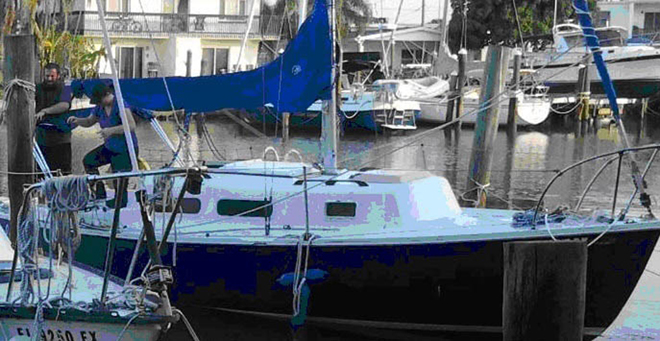MIAMI (AP) — A Florida couple accused of kidnapping their two young sons and fleeing by boat to Cuba were handed over to the United States and imprisoned and their children were returned to their maternal grandparents, who have official custody, authorities said Wednesday.
Joshua Michael Hakken and his wife, Sharyn, were being held at the Hillsborough County Jail on a number of charges including kidnapping, child neglect and interference with custody, the Hillsborough County Sheriff’s Office said on its website.
The couple are expected to make their first appearance Thursday in Hillsborough County Court, the sheriff’s office said in a statement. It was not immediately known if either of the Hakkens has an attorney. The couple will not face federal charges, said David Couvertier, a spokesman for the FBI in Tampa.
U.S. authorities say Hakken kidnapped his sons, 4-year-old Cole and 2-year-old Chase, from his mother-in-law’s house north of Tampa, Florida. The boys’ grandparents were granted permanent custody of the boys last week.
“Our grandchildren are safe,” the grandfather, Bob Hauser, told a news conference with the sheriff’s office late Tuesday. “We had an opportunity to talk with them before they left Cuba.”
Bob and his wife, Patricia Hauser, asked the news media to give them at least 24 hours alone with the boys, the sheriff’s department said in a statement. They planned to make a public statement possibly by Thursday.
Cuba tipped the State Department off to the Hakkens’ presence Sunday, and from that moment “diplomatic contact has been exchanged and a professional and constant communication has been maintained,” Cuban Foreign Ministry official Johana Tablada said in a statement.
An AP reporter spotted the couple and the children beside their boat at the Hemingway Marina in Havana on Tuesday. A man who resembled photographs of Joshua Michael Hakken yelled out “Stop! Stay back!” as the reporter approached, but there was no outward sign of tension or distress between the family members.
The family showed no sign they knew a decision about their fate had been made. The four strolled by an outdoor restaurant as security officials kept reporters at a distance. The youngest child was seated in a stroller and the elder boy sat down on a curb.
The U.S. and Cuba share no extradition agreement and the island nation is also not a signatory of the Hague Convention on the Civil Aspects of International Child Abduction, an international treaty for governmental cooperation on such cases.
Cuba has harbored U.S. fugitives in the past, though most of those cases date back to the 1960s and ’70s, when the island became a refuge for members of the Black Panthers and other militant groups. More recently, dozens of Cuban Medicare fraud fugitives in the U.S. have tried to escape prosecution by returning to the island.
But Cuba has also cooperated with U.S. authorities in returning several criminal fugitives in recent years, including Leonard B. Auerbach in 2008. Auerbach was wanted in California on federal charges of sexually abusing a Costa Rican girl and possessing child pornography. He was deported.
In 2011, U.S. marshals flew to Cuba and took custody of two U.S. suspects wanted in a New Jersey slaying.
Hakken lost custody of his sons last year after a drug possession arrest in Louisiana and later tried to take the children from a foster home at gunpoint, authorities said. A warrant had been issued for his arrest on two counts of kidnapping; interference with child custody; child neglect; false imprisonment and other charges.
Hakken entered his mother-in-law’s Florida house last Wednesday, tied her up and fled with his sons, the sheriff’s department has said. Federal, state and local authorities searched by air and sea for a boat Hakken had recently bought. The truck that Hakken, his wife and the boys had been traveling in was found Thursday, abandoned in Madeira Beach, Florida.
The family’s flight to Cuba harkened back to the 1999 child custody case involving Elian Gonzalez, though unlike Gonzalez, the Hakkens had no apparent ties to the island.
In 1999, 5-year-old Gonzalez was found clinging to an inner tube off Florida after his mother and others drowned while fleeing Cuba toward American soil. The boy was taken to Miami to live with relatives, but his father in Cuba demanded the boy be sent back.
U.S. courts ultimately ruled Gonzalez should be sent back, though his Miami relatives refused to return him. In April 2000, U.S. federal agents raided the family’s home and he was returned to Cuba soon after. He has since grown into a young man and joined a military academy.
_____
Associated Press writers Christine Armario, Curt Anderson and Kelli Kennedy in Miami; Kevin McGill in New Orleans; Paul Haven and Peter Orsi in Havana; and Matthew Lee in Washington contributed to this report.
_____
Suzette Laboy on Twitter: www.twitter.com/SuzetteLaboy
Paul Haven on Twitter: www.twitter.com/paulhaven
Peter Orsi on Twitter: www.twitter.com/Peter_Orsi
Copyright 2013 The Associated Press.






